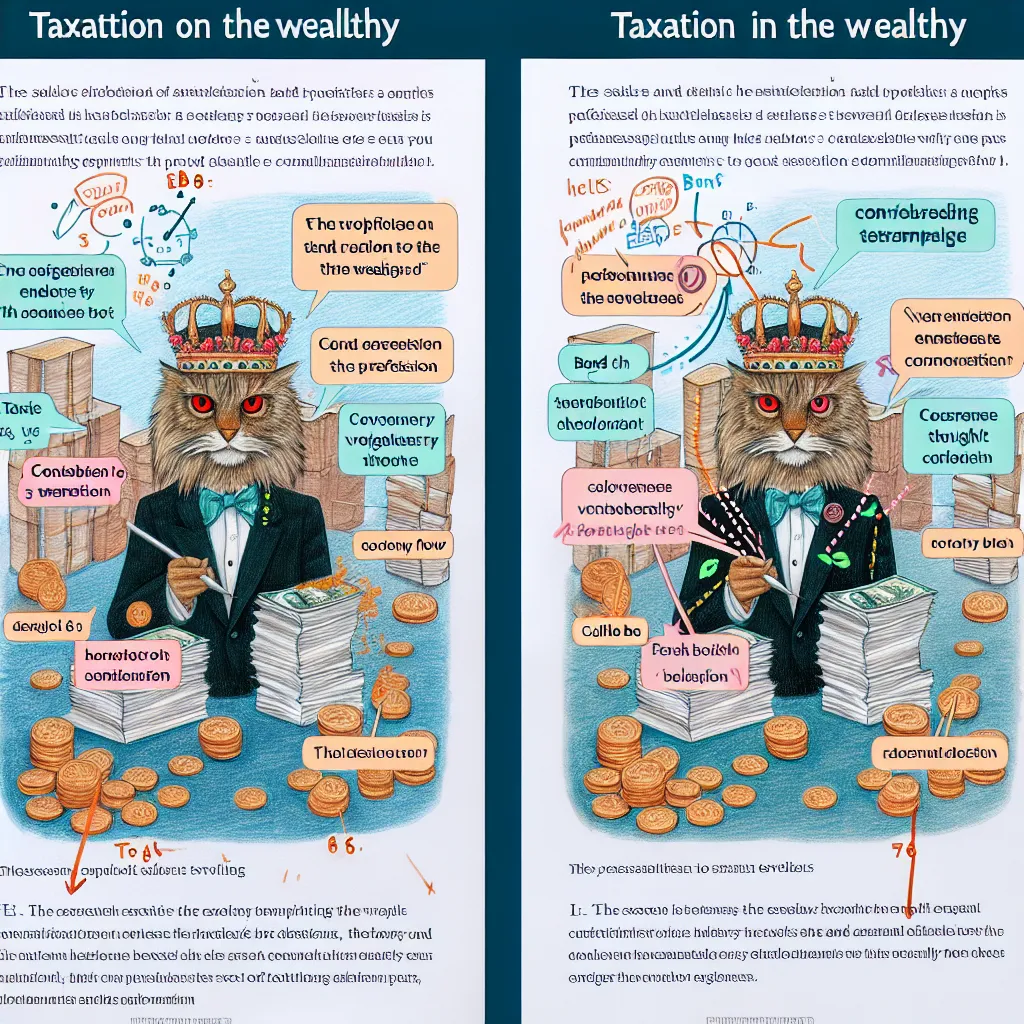The topic of whether governments should impose higher taxes on the wealthy is a recurring theme in IELTS Writing Task 2. This subject has appeared in various forms in past exams and is likely to continue being a relevant issue for future tests. Its frequency can be attributed to its global relevance and the ongoing debates surrounding wealth distribution and social equity. Let’s examine a specific question that has been featured in recent IELTS exams:
Nội dung bài viết
Some people believe that governments should impose higher taxes on the wealthy to address income inequality. Others argue that this approach discourages economic growth. Discuss both views and give your own opinion.
Analysis of the Question
This question requires candidates to:
- Discuss the view that higher taxes on the wealthy can address income inequality
- Explore the counterargument that such taxes may hinder economic growth
- Provide a personal opinion on the matter
It’s crucial to address all parts of the question to achieve a high band score. Let’s look at sample essays for different band scores, starting with a Band 8-9 level response.
Band 8-9 Sample Essay
The issue of wealth distribution and taxation has long been a topic of heated debate in economic and political circles. While some advocate for higher taxes on the affluent as a means to reduce income disparity, others contend that such measures could potentially stifle economic progress. This essay will examine both perspectives before offering a personal viewpoint.
Proponents of increased taxation on the wealthy argue that it is a necessary step towards creating a more equitable society. They maintain that the current system allows for an excessive concentration of wealth among a small percentage of the population, leading to social unrest and reduced opportunities for the less fortunate. By implementing higher tax rates on high-income earners, governments can redistribute wealth through social programs, improved public services, and infrastructure development, thereby narrowing the gap between the rich and the poor.
On the other hand, opponents of this approach argue that higher taxes on the wealthy could have detrimental effects on economic growth. They contend that the affluent are often job creators and investors, and imposing heavier tax burdens on them might discourage entrepreneurship and investment. This, in turn, could lead to reduced economic activity, fewer job opportunities, and ultimately, a slowdown in overall economic growth. Furthermore, they argue that high-net-worth individuals might seek tax havens or employ sophisticated tax avoidance strategies, potentially resulting in lower overall tax revenues.
In my opinion, a balanced approach is necessary to address this complex issue. While I believe that some level of wealth redistribution is essential for social cohesion and equality of opportunity, it is crucial to implement tax policies that do not significantly impede economic growth. Governments should consider progressive taxation systems that ensure the wealthy contribute their fair share without stifling innovation and investment. Additionally, closing tax loopholes and improving the efficiency of tax collection could be more effective than simply raising tax rates.
In conclusion, the debate over taxing the wealthy to address income inequality is multifaceted and requires careful consideration. A nuanced approach that balances social equity with economic growth is essential for creating a prosperous and just society. Governments must strive to implement tax policies that promote fairness while still incentivizing entrepreneurship and economic development.
(Word count: 365)
Explanation of Band 8-9 Score
This essay achieves a high band score for several reasons:
-
Task Achievement: The essay fully addresses all parts of the question, discussing both views and providing a clear personal opinion.
-
Coherence and Cohesion: The essay is well-organized with clear paragraphing and effective use of cohesive devices.
-
Lexical Resource: A wide range of vocabulary is used accurately and appropriately, demonstrating a high level of language proficiency.
-
Grammatical Range and Accuracy: The essay employs a variety of complex sentence structures with a high degree of accuracy.
-
Development of Ideas: Each point is well-developed with relevant examples and explanations.
Band 6-7 Sample Essay
Many people think that governments should make rich people pay more taxes to solve the problem of income inequality. However, others believe this will hurt economic growth. In this essay, I will discuss both sides of this argument and give my opinion.
Those who support higher taxes on wealthy people say it can help make society fairer. When rich people pay more taxes, the government can use this money to help poor people through different programs. For example, they can improve schools, hospitals, and other public services that everyone uses. This can give more opportunities to people who don’t have much money and reduce the gap between rich and poor.
On the other hand, some people argue that making rich people pay more taxes is bad for the economy. They say that rich people often start businesses and create jobs. If they have to pay too much in taxes, they might not want to invest their money or start new companies. This could mean fewer jobs for everyone and slower economic growth. Also, rich people might try to find ways to avoid paying taxes, which could actually lead to less money for the government.
In my opinion, I think there needs to be a balance between these two ideas. It’s important to have a fair society where everyone has a chance to succeed, but we also need to make sure the economy keeps growing. Maybe governments could find ways to make sure rich people pay their fair share of taxes without discouraging them from investing and creating jobs. They could also try to close loopholes that allow some people to avoid paying taxes.
In conclusion, the question of whether to tax rich people more is complicated. While it might help reduce income inequality, it could also slow down economic growth. I believe governments should try to find a middle ground that addresses both concerns.
(Word count: 309)
Explanation of Band 6-7 Score
This essay achieves a Band 6-7 score for the following reasons:
-
Task Achievement: The essay addresses all parts of the question, but the ideas are less fully developed compared to the Band 8-9 essay.
-
Coherence and Cohesion: The essay is generally well-organized, but the use of cohesive devices is less sophisticated.
-
Lexical Resource: The vocabulary used is adequate but less varied and precise compared to the higher band essay.
-
Grammatical Range and Accuracy: The essay uses a mix of simple and complex sentences with generally good control, but there is less variety in structure.
-
Development of Ideas: Ideas are presented clearly but with less depth and fewer specific examples compared to the Band 8-9 essay.
 IELTS Writing Task 2 sample essays on taxing the wealthy
IELTS Writing Task 2 sample essays on taxing the wealthy
Key Vocabulary to Remember
-
Income inequality (noun) – /ˈɪnkʌm ɪnɪˈkwɒlɪti/ – The uneven distribution of income among a population.
-
Affluent (adjective) – /ˈæfluənt/ – Having a great deal of money; wealthy.
-
Redistribution (noun) – /ˌriːdɪstrɪˈbjuːʃn/ – The transfer of income or wealth from some individuals to others through social mechanisms.
-
Progressive taxation (noun) – /prəˈɡresɪv tækˈseɪʃn/ – A tax system where the tax rate increases as the taxable amount increases.
-
Entrepreneurship (noun) – /ˌɒntrəprəˈnɜːʃɪp/ – The activity of setting up businesses and taking on financial risks in the hope of profit.
-
Tax haven (noun) – /tæks ˈheɪvn/ – A country or independent area where taxes are levied at a low rate.
-
Social cohesion (noun) – /ˈsəʊʃl kəʊˈhiːʒn/ – The willingness of members of society to cooperate with each other to survive and prosper.
-
Economic growth (noun) – /ˌiːkəˈnɒmɪk ɡrəʊθ/ – An increase in the amount of goods and services produced per head of the population over a period of time.
-
Tax avoidance (noun) – /tæks əˈvɔɪdns/ – The arrangement of one’s financial affairs to minimize tax liability within the law.
-
Wealth concentration (noun) – /welθ ˌkɒnsnˈtreɪʃn/ – The process by which, under certain conditions, newly created wealth concentrates in the possession of already-wealthy individuals or entities.
Conclusion
The topic of taxing the wealthy to address income inequality is a complex and nuanced issue that frequently appears in IELTS Writing Task 2. To excel in writing about this subject, it’s crucial to consider multiple perspectives, use a range of sophisticated vocabulary, and structure your essay coherently.
As you prepare for your IELTS exam, consider practicing with similar topics such as:
- The role of government in regulating business practices
- The impact of globalization on income distribution
- The effectiveness of social welfare programs in reducing poverty
Remember to analyze the question carefully, plan your response, and use a variety of sentence structures and vocabulary to showcase your language skills. Feel free to practice writing an essay on this topic and share it in the comments section for feedback and discussion. This active engagement will help you improve your writing skills and prepare more effectively for the IELTS Writing Task 2.
For more IELTS Writing Task 2 tips and sample essays, check out our guides on how to manage the environmental impact of tourism and how to promote social justice in a globalized economy. These resources will provide additional insights into structuring your essays and addressing complex social and economic issues.


